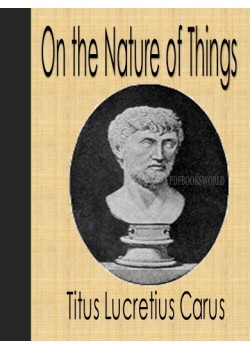

Genre(s): Classics (Greek & Latin Antiquity), Poetry, Ancientīook I, Part 4: Nothing Exists per se Except Atoms and the Voidīook I, Part 6: Confutation of Other Philosophersīook I, Part 7: The Infinity of the Universeīook II, Part 3: Atomic Forms and Their Combinationsīook II, Part 4: Absence of Secondary Qualitiesīook III, Part 2: Nature and Composition of the Mindīook III, Part 4: Folly of the Fear of Deathīook IV, Part 2: Existence and Character of the Imagesīook IV, Part 3: The Senses and Mental Picturesīook V, Part 2: Argument of the Book and New Proem Against a Teleological Conceptīook V, Part 4: Formation of the World and Astronomical Questionsīook V, Part 5: Origins of Vegetable and Animal Lifeīook V, Part 6: Origins and Savage Period of Mankindīook V, Part 7: Beginnings of Civilizationīook VI, Part 2: Great Meteorological Phenomena, Etc.Bookplate of the Earls of Macclesfield, front pastedown.

To this end he offers us his enlightening verses, that through them might be revealed to us "nature's aspect, and her laws". While the six untitled books that comprise On the Nature of Things delve into a broad range of subjects, including the physical nature of the universe, the workings of the human mind and body, and the natural history of the Earth, Lucretius repeatedly asserts throughout the work that his chief purpose is to provide the reader with a means to escape the "darkness of the mind" imposed by superstition and ignorance.

Although Leonard penned his version in the early twentieth century, he chose to adhere to both the vocabulary and meter (alternating between pentameter and hexameter) of Elizabethan-era poetry. The version read here is an English verse translation written by William Ellery Leonard. Far from being a dry treatise on the many topics it covers, the original Latin version (entitled De Rerum Natura) was written in the form of an extended poem in hexameter, with a beauty of style that was admired and emulated by his successors, including Ovid and Cicero. On the Nature of Things, written in the first century BCE by Titus Lucretius Carus, is one of the principle expositions on Epicurean philosophy and science to have survived from antiquity. Translated by William Ellery Leonard (1876 - 1944) Download cover art Download CD case insert On the Nature of Things (Leonard translation)


 0 kommentar(er)
0 kommentar(er)
